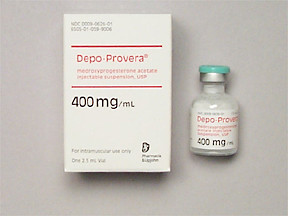MEDROXYPROGESTERONE ACETATE (ANTICANCER AGENT) - INJECTION
PHONETIC PRONUNCIATION: (med-ROX-ee-proe-JES-ter-one As-e-tate)
COMMON BRAND NAME(S): Depo-Provera
GENERIC NAME(S): medroxyprogesterone acetate
Uses
USES: This medication is used to treat certain types of cancer (such as uterine cancer, kidney cancer). Medroxyprogesterone is like a natural hormone called progesterone made by the body. It is usually used with or after other treatments (such as radiation, surgery). Medroxyprogesterone may prevent or slow the worsening of the cancer and decrease pain and other symptoms.
How to use MEDROXYPROGESTERONE ACETATE (ANTICANCER AGENT) - INJECTION
HOW TO USE: Read the Patient Information Leaflet provided by your pharmacist before you start using medroxyprogesterone and each time you get a refill. If you have any questions, consult your doctor or pharmacist. This medication is given by injection into a muscle by a health care professional. It is usually given once a week or as directed by your doctor. The dosage is based on your medical condition and response to treatment. When the medication is working and your condition stops getting worse, your doctor may direct you to have your injections less often, such as once a month. Use this medication regularly in order to get the most benefit from it. It may help to mark your calendar with a reminder. Keep all your medical appointments. Tell your doctor if your condition worsens.
Side Effects
Precautions
Interactions
Overdose
Images
Reviews
Disclaimer
IMPORTANT: HOW TO USE THIS INFORMATION: This is a summary and does NOT have all possible information about this product. This information does not assure that this product is safe, effective, or appropriate for you. This information is not individual medical advice and does not substitute for the advice of your health care professional. Always ask your health care professional for complete information about this product and your specific health needs.

No Reviews Yet